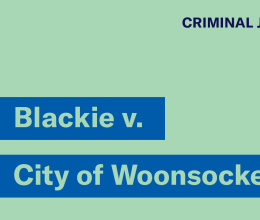The Rhode Island ACLU expressed disappointment with a federal appeals court ruling upholding the dismissal of a lawsuit the ACLU filed in 2007 against the R.I. State Police, challenging the legality of the detention and transporting to immigration officials of fourteen people, all Guatemalans, who were stopped in a van on I-95 after the driver changed lanes without using a turn signal. The ACLU lawsuit, filed on behalf of eleven of the individuals, had argued that the detention violated the driver and passengers’ constitutional rights to be free from discrimination and from unreasonable searches and seizures.
Without finding that the state trooper’s actions in the case were necessarily constitutional, the appeals court nonetheless held that a reasonable officer could have believed that they were, thus entitling the trooper to “qualified immunity” from suit. RI ACLU executive director Steven Brown said that the decision “highlights the need for passage of comprehensive racial profiling legislation in Rhode Island – both to provide greater clarity in the law and to prevent police from prolonging routine traffic stops based on the appearance and language of the passengers.”
In this case, the detention of the passengers had ensued even though the trooper confirmed that the license and registration of driver Carlos Tamup were valid, and that Tamup had no criminal record. Utilizing Tamup as a translator, the trooper nonetheless asked all the passengers to also provide identification. When some did not produce ID, Chabot asked if they possessed any documents demonstrating their U.S. citizenship. After further delays, the trooper advised them that they would all be escorted to the immigration office in Providence.
The van stop generated significant controversy in the civil rights community, and a number of groups expressed concern at the time that the traffic stop had created a “chill” in the Latino community, with residents fearful of contacting the police to report crimes lest their own immigration status be investigated.
Calling the ruling “disappointing,” the ACLU’s Brown said: “The court decision, by relying on the doctrine of qualified immunity to decide this case, has left open many questions about the validity of traffic stops and detentions like this one. Unfortunately, by failing to find the state police culpable, the decision, however unintentionally, can only encourage more racial profiling on Rhode Island’s roads. We hope that the General Assembly will now act on legislation setting clear standards that will help reduce the long-standing racial disparities that exist in the state when it comes to stopping and searching motor vehicles.” A series of reports issued by Northeastern University and the RI ACLU have documented how racial minorities in Rhode Island are much more likely than whites to be stopped and searched by police, even though they are less likely to be found with contraband.







